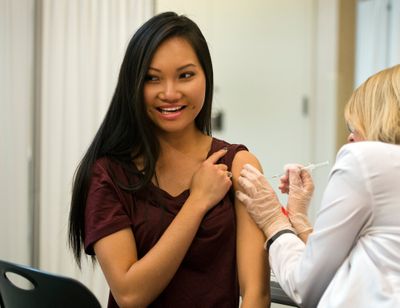Washington health officials encourage vaccination as triple-whammy respiratory season approaches

Respiratory virus season is here, and it’s a triple-whammy.
Unlike normal respiratory virus seasons, this year brings three viruses to watch out for: influenza, respiratory syncytial virus, also known as RSV, and COVID-19.
Influenza cases are on the rise across the country earlier than normal, RSV rates are spiking and COVID-19 continues to spread.
Health officials encourage everyone to stay up to date with flu shots and COVID-19 vaccines and boosters.
Despite the trifecta of diseases, there are fewer COVID hospitalizations than last year at this time.
“While we are all concerned about what may lie ahead, we are nowhere near where we were two years ago or even last year,” Secretary of Health Dr. Umair Shah told reporters Thursday.
But Shah warned that there are still “uncertainties about what lies ahead.”
Chief Science Officer Dr. Tao Kwan-Gett said though cases have been trending down since the summer, there is no way of predicting COVID-19 activity.
“Nobody has a crystal ball, and we can’t predict the future and we can’t predict the course that the COVID-19 pandemic will take,” Kwan-Gett said. “But I think it is important to prepared for the possibility of another surge, another wave.”
Locally, it’s hard to tell exactly how many RSV cases there are, but Spokane County Health Officer Dr. Francisco Velazquez said anecdotally, there has been an increase in the number of RSV cases in Washington and Spokane, though the state doesn’t have concrete data.
Hospitals in Spokane don’t have exact numbers on how many RSV cases there have been this year, but Providence spokesperson Ariana Lake said there has been a rise in cases, though “not at alarming or unusual rates for this time of year.”
Health officials encouraged everyone to continue to wear masks in crowded indoor settings and get vaccinated against COVID-19. Though Gov. Jay Inslee’s state of emergency is ending Monday, masks will remain required in health care settings and correctional facilities, given the current Secretary of Health order.
Shah said the state is looking at current mask requirements in those areas and will likely have updated guidance in mid-November.
Receiving an updated COVID-19 booster is the best way to protect yourself from COVID-19, but only about 15% of eligible Washington residents have received one, said Lacy Fehrenbach, deputy secretary for prevention, safety and health.
Receiving the updated booster is “crucial” to protect yourself from current COVID-19 strains, she said.
It also protects already-stressed hospital systems from becoming further overwhelmed, she said.
In addition to updated COVID-19 boosters, health officials recommend getting an annual flu shot.
Flu season is officially here, and Washington already has had two flu-related deaths, Shah said.
One of those was local. The Spokane Regional Health District last week reported its first flu-related death of a patient in their 60s with underlying health conditions.
As of Tuesday, Spokane County had two confirmed influenza hospitalizations, according to the health district. This time last season, there were zero hospitalizations and zero deaths.
“This is a reminder that flu remains deadly,” Shah said.
Along with an early flu season, RSV is also on the rise nationally and in Washington with a number of children’s hospitals seeing record emergency volumes.
Symptoms of RSV are similar to a cold, and patients often recover in a week, Kwan-Gett said, but infants and children can be affected for much longer.
There’s no vaccine for RSV, but there is a monoclonal antibody treatment for it, he said.
Another virus health officials are watching: monkeypox, or MPV.
As of Wednesday, Washington has seen 621 cases and 18 hospitalizations. There have only been five new cases in the last week, Kwan-Gett said.
“The outbreak is continuing to wane, though it is too early to be confident that it is ending,” he said.